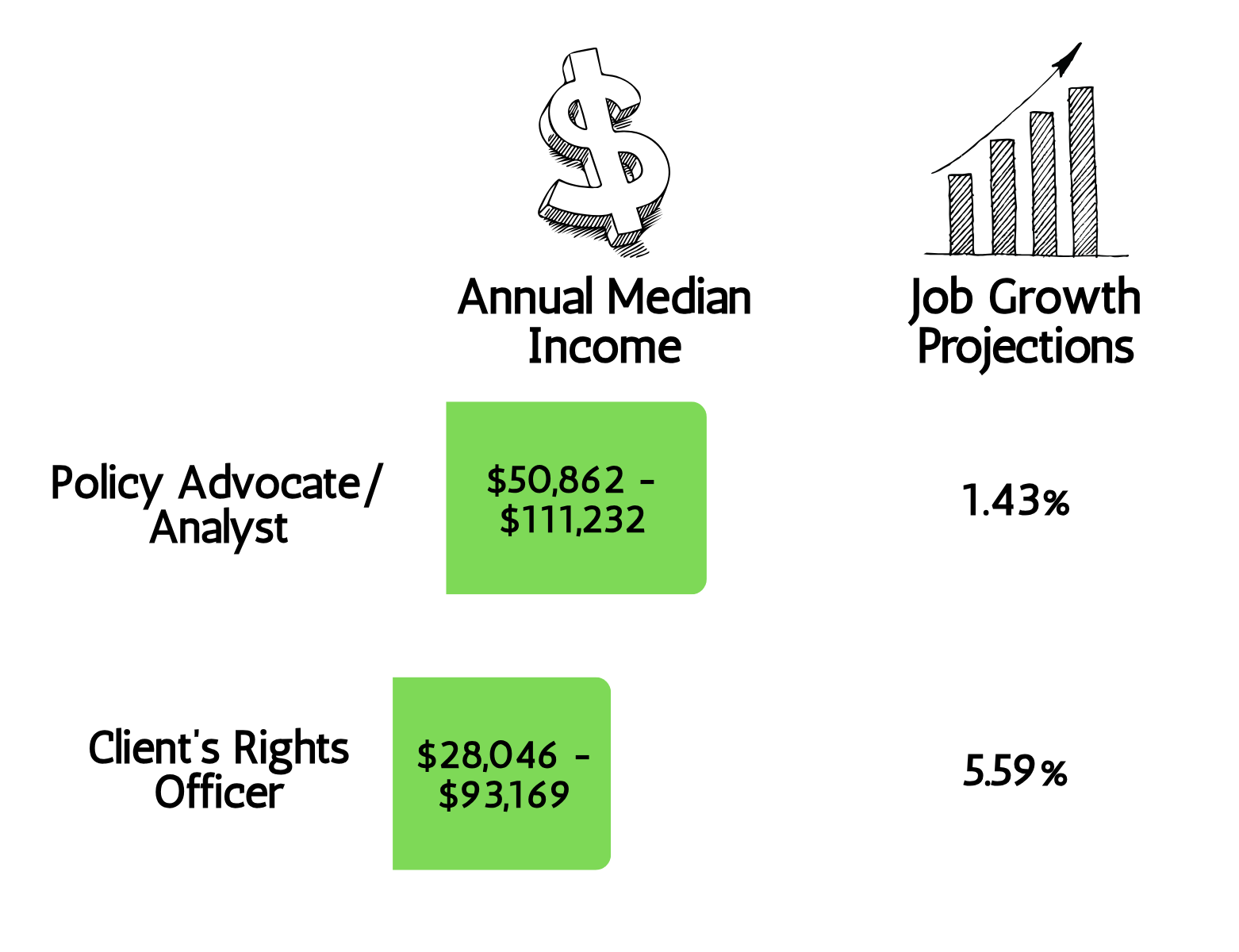Careers in Advocacy:
Is Working in Advocacy Right for You?
Is Working in Behavioral Health Research for You?
Do you care deeply about helping others, especially those facing mental health or addiction challenges? Are you someone who listens well, stands up for fairness, and wants to make a real difference in your community? Do you have strong mediation skills, good communication, and can help groups find common ground? If so, a career in behavioral health advocacy in Ohio might be perfect for you!
*Please note that the job recommendations listed throughout this page will vary by agency and county, as some may require additional training or licensure.
Your Path to a Career in ADVOCACY
What does it take?
Get Educated
Get Experience
Get Ahead
Income varies and is based on role, location, experience, education, and licensing/credentials. Job growth projections are for 2023-2033. Ohio LMI
Salary ranges are based on what’s currently available through Zip Recruiter, Indeed, Career One Stop, or Salary Expert.

Get more info in the FAQs
ADVOCACY PROFESSIONALS - FAQ
-
Help Others Thrive: Support people overcoming mental health and addiction challenges.
Be a Voice for Change: Advocate for better policies and services in your community.
Work with Purpose: Every day brings opportunities to make a positive impact.
Learn and Grow: Develop valuable skills in communication, problem-solving, and leadership.
Join a Caring Community: Collaborate with professionals who share your passion.
Advocacy offers a fulfilling path where you can empower others and drive meaningful change.
-
With a bachelor's degree or higher:
Client Advocate
A Client Advocate helps individuals get the services, support, and information they need—especially during times of crisis or when facing challenges like mental health issues, substance use, or housing problems. They listen to clients’ concerns, explain their rights, connect them to resources, and help them navigate systems like healthcare, social services, or legal aid. Client Advocates also speak up for their clients when needed, making sure their voices are heard and their needs are respected.
Policy Advocate/ Analyst
A Policy Advocate/Analyst works to change laws or rules to make mental health care better for everyone. They study problems, suggest solutions, and speak up to leaders and lawmakers. Their work helps improve services and support for people across Ohio.
With a master's degree or higher:
Client’s Rights Officer
A Client’s Rights Officer makes sure people receiving mental health or addiction services are treated fairly and with respect. They help protect client rights, listen to complaints, and work to solve problems. They stand up for clients when there are concerns about treatment or ethical standards.
Other job titles you may see:
Ombudsman
Family Advocate
Policy Specialist
Grievance Officer
Patient Rights Advocate
Whether working directly with individuals or influencing policy, advocacy offers varied and impactful roles.
-
Support Individuals: Assist clients in accessing mental health and addiction services.
Navigate Systems: Help people understand and utilize healthcare, education, and social service systems.
Educate Communities: Raise awareness about mental health and reduce stigma.
Influence Policy: Work with lawmakers to improve mental health laws and funding.
Collaborate with Teams: Partner with healthcare providers, schools, and organizations.
Advocates play a crucial role in guiding individuals and shaping supportive communities.
-
Hospitals and treatment centers
Community mental health agencies
Schools and colleges
Government offices
Nonprofit and social services
Legal aid organizations
Disability rights offices
Advocates operate in diverse environments, meeting people where they are.
-
Adults and Children with Mental or Behavioral Health Conditions: Eliminate barriers that prevent access to care, services, and inclusive support systems
People in Recovery from Substance Use: Promote stigma-free treatment, peer support, and recovery-friendly policies
Families and Caregivers: Provide education, resources, and support navigating mental health systems
Veterans, Students, and Older Adults: Address unique needs and barriers to care through outreach and tailored awareness campaigns
Individuals or Groups Who May Feel Unheard or Misunderstood: Amplify voices, fight discrimination, and push for equitable mental health services
Advocates serve a wide range of individuals, ensuring everyone has a voice and access to care.
-
While some entry-level positions may require only a high school diploma or GED, many advocacy roles benefit from further education:
Bachelor’s degree In fields like nursing, social work, psychology, public health, or public policy or human services.
Master’s or doctoral degrees in these fields are needed roles in policy or clinical settings.
Specific requirements vary by position and employer.
-
There is no advocacy-specific license or certification in Ohio. However, some roles require professionals to be licensed or certified. Below are some examples of licensure available in Ohio.
Licensed Social Workers (LSW) and Licensed Independent Social Workers (LISW)
Licensed Professional Counselors (LPC) and Licensed Professional Clinical Counselors (LPCC)
Proper licensure ensures advocates meet professional standards and are equipped to serve effectively.
Click here to learn more about licenses, credentials, and certifications.
Disclaimer: The information provided on this website is accurate to the best of our knowledge at the time of publication. If you notice any errors or outdated information, please contact accounts@mhaadvocacy.org so we can make the necessary corrections.


